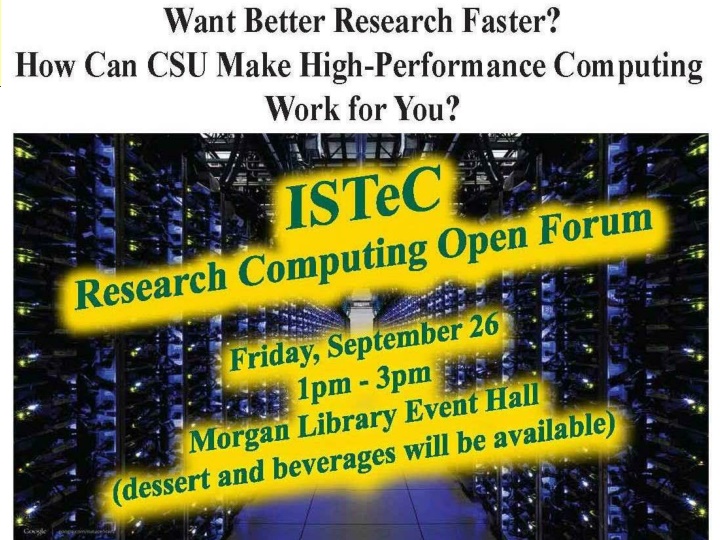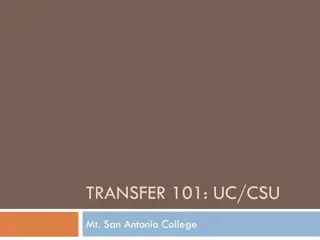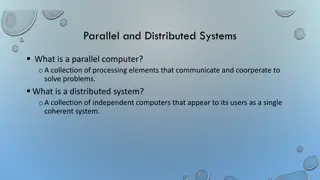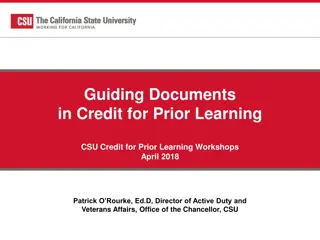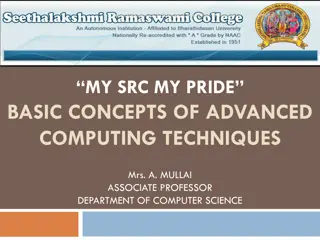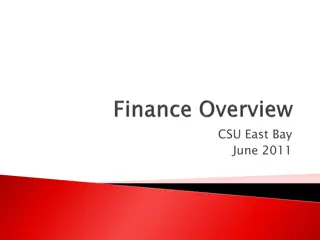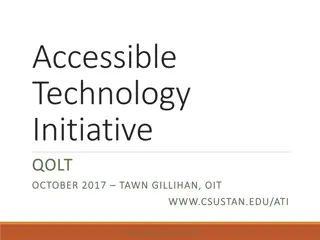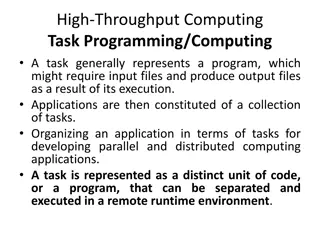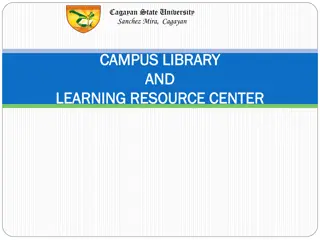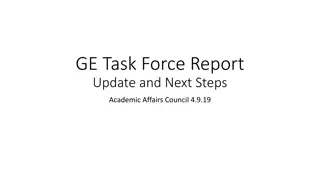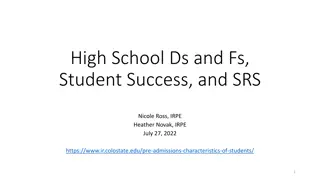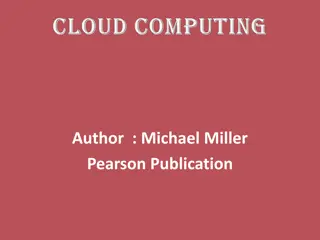Enhancing High-Performance Computing at CSU
This open forum, led by Prof. H.J. Siegel, focuses on improving CSU's high-performance computing capabilities. The committee seeks to gather feedback to enhance research equipment, software packages, and education for a faster and more efficient computing experience. Despite past successes, CSU aims to address current challenges such as accommodating user growth, supporting large-data applications, and keeping up with the latest hardware technology. By bridging gaps in capacity, technology, and support services, CSU aims to strengthen its position in the field of high-performance computing.
Download Presentation

Please find below an Image/Link to download the presentation.
The content on the website is provided AS IS for your information and personal use only. It may not be sold, licensed, or shared on other websites without obtaining consent from the author.If you encounter any issues during the download, it is possible that the publisher has removed the file from their server.
You are allowed to download the files provided on this website for personal or commercial use, subject to the condition that they are used lawfully. All files are the property of their respective owners.
The content on the website is provided AS IS for your information and personal use only. It may not be sold, licensed, or shared on other websites without obtaining consent from the author.
E N D
Presentation Transcript
ISTeC Research Computing Committee Open Forum Prof. H. J. Siegel Abell Endowed Chair Distinguished Professor of Electrical and Computer Engineering and Professor of Computer Science
ISTeC Research Computing Open Forum H. J. Siegel Abell Endowed Chair Distinguished Professor of Electrical and Computer Engineering and Professor of Computer Science Want Better Research Faster? How Can CSU Make High-Performance Computing (HPC) Work for You? Objective of Open Forum gather feedback so CSU can provide HPC for your research equipment, software packages, education, consulting determine an approach for providing these needs 2 2
Definition of HPC (High-Performance Computing) HPC definition is a loose guideline for our committee s work Any computer program or software application that requires or would benefit from the use of numerous processors and/or computers to process some volume of data within a reasonable timeframe that would be beyond the capabilities of a single laptop/desktop/workstation computer. also a need on campus for storage that is higher performance and/or larger in scale than is found with a typical desktop there is a separate ISTeC Data Management Committee we will interact with that committee to avoid reinventing what they are doing while being sure that data issues are not ignored 3
What We Have Today ISTeC won NSF MRI grant in 2009 for a campus HPC system ISTeC Cray operational in January 2011 for small to medium-sized applications a diverse and steadily growing user base, exceeding capability excellent HPC courses and tutorials in the past a reliable, but aging, hardware environment a rich suite of customized software application packages industrial participation (Woodward) successful 4
What are We Lacking Today capacity to accommodate growth in users to ~ 1,000 within 2 to 3 years bigger, more complex, large-data applications ability to allow users to have large subsystems for a week latest hardware technology (including accelerators) > 10X increase in performance latest internal processor interconnect technology especially for large, complex, multi-physics problems big data, fast storage support for continuing to teach courses on how to use HPC support for an HPC consulting service CSU is now behind other institutions in the state in HPC that have significant internal financial support - UCB, Mines 5
ISTeC Research Computing Committee constituted by the Offices of the Vice Presidents for Research and Information Technology (VPR and VPIT) received charge from VPIT on April 28, 2014 determine a strategy for research computing for CSU consider alternatives for research computing systems, both on-campus and off-campus analyze the range and scope of the research computing being done at CSU that needs HPC if the ISTeC Cray is being used efficiently and effectively try to finish report by end of October 2014 6
ISTeC Research Computing Committee Members H.J. Siegel, Electrical & Computer Eng g Dept., COE - Chair Wim Bohm, Computer Science Dept., CNS Randy Boone, Ecosystem Science & Sustain. Dept., WCNR Ray Browning, Health and Exercise Science Dept., CAHS Richard Casey, Infectious Disease Research Center (IDRC) Dan Cooley, Statistics Dept., CNS Mark Enns, Animal Sciences Dept., CAS Xinfeng Gao, Mechanical Engineering Dept., COE Dan Hamp, ACNS Bhavesh Khemka, student/Post-Doc rep. and ISTeC Cray user Scott Novogoratz, CVMBS Tony Rappe, Chemistry Dept., CNS Dan Turk, Computer Information Systems Dept., COB 7
Open Forum Agenda 1. ISTeC Research Computing Committee - H.J. Siegel, ECE (5/5) 2. Welcome - Pat Burns, VPIT, and Aaln Rudolph, VPR (5/5) 3. Brief Overview of ISTeC Cray - Rick Casey, ACNS/IDRC (5/5) 4. Purdue CIO HPC Approach - Scott Novogoratz, CVMBS (5/5) 5. Survey of HPC at Other Universities - Pat Burns, VPIT (5/5) 6. Survey of HPC Needs at CSU - Tony Rappe, Chemistry (10/10) 7. Using Cloud Computing - Rick Casey, ACNS/IDRC (5/5) 8. Using NSF or Nat l Lab Machines - Bhavesh Khemka, ECE (5/5) 9. Model HPC Consulting - Ray Browning, Biomed. Eng. (5/5) 10. Additional feedback and discussion (20 minutes) 8
